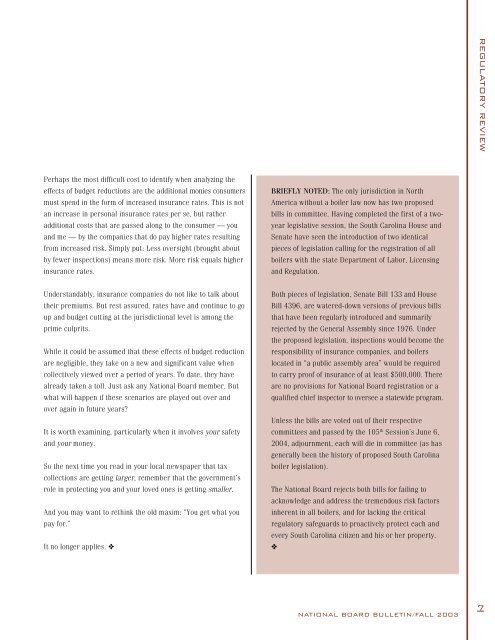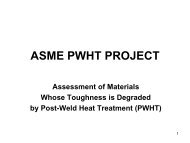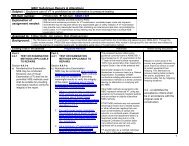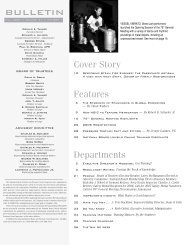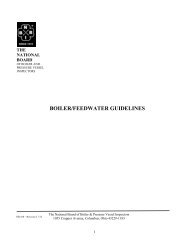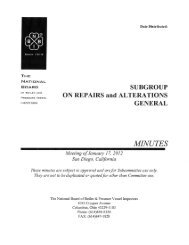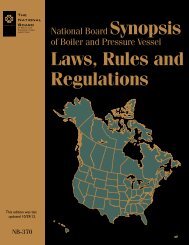bulletin - The National Board of Boiler and Pressure Vessel Inspectors
bulletin - The National Board of Boiler and Pressure Vessel Inspectors
bulletin - The National Board of Boiler and Pressure Vessel Inspectors
You also want an ePaper? Increase the reach of your titles
YUMPU automatically turns print PDFs into web optimized ePapers that Google loves.
Perhaps the most difficult cost to identify when analyzing the<br />
effects <strong>of</strong> budget reductions are the additional monies consumers<br />
must spend in the form <strong>of</strong> increased insurance rates. This is not<br />
an increase in personal insurance rates per se, but rather<br />
additional costs that are passed along to the consumer — you<br />
<strong>and</strong> me — by the companies that do pay higher rates resulting<br />
from increased risk. Simply put: Less oversight (brought about<br />
by fewer inspections) means more risk. More risk equals higher<br />
insurance rates.<br />
Underst<strong>and</strong>ably, insurance companies do not like to talk about<br />
their premiums. But rest assured, rates have <strong>and</strong> continue to go<br />
up <strong>and</strong> budget cutting at the jurisdictional level is among the<br />
prime culprits.<br />
While it could be assumed that these effects <strong>of</strong> budget reduction<br />
are negligible, they take on a new <strong>and</strong> significant value when<br />
collectively viewed over a period <strong>of</strong> years. To date, they have<br />
already taken a toll. Just ask any <strong>National</strong> <strong>Board</strong> member. But<br />
what will happen if these scenarios are played out over <strong>and</strong><br />
over again in future years?<br />
It is worth examining, particularly when it involves your safety<br />
<strong>and</strong> your money.<br />
So the next time you read in your local newspaper that tax<br />
collections are getting larger, remember that the government’s<br />
role in protecting you <strong>and</strong> your loved ones is getting smaller.<br />
And you may want to rethink the old maxim: “You get what you<br />
pay for.”<br />
It no longer applies. ❖<br />
BRIEFLY NOTED: <strong>The</strong> only jurisdiction in North<br />
America without a boiler law now has two proposed<br />
bills in committee. Having completed the first <strong>of</strong> a twoyear<br />
legislative session, the South Carolina House <strong>and</strong><br />
Senate have seen the introduction <strong>of</strong> two identical<br />
pieces <strong>of</strong> legislation calling for the registration <strong>of</strong> all<br />
boilers with the state Department <strong>of</strong> Labor, Licensing<br />
<strong>and</strong> Regulation.<br />
Both pieces <strong>of</strong> legislation, Senate Bill 133 <strong>and</strong> House<br />
Bill 4396, are watered-down versions <strong>of</strong> previous bills<br />
that have been regularly introduced <strong>and</strong> summarily<br />
rejected by the General Assembly since 1976. Under<br />
the proposed legislation, inspections would become the<br />
responsibility <strong>of</strong> insurance companies, <strong>and</strong> boilers<br />
located in “a public assembly area” would be required<br />
to carry pro<strong>of</strong> <strong>of</strong> insurance <strong>of</strong> at least $500,000. <strong>The</strong>re<br />
are no provisions for <strong>National</strong> <strong>Board</strong> registration or a<br />
qualified chief inspector to oversee a statewide program.<br />
Unless the bills are voted out <strong>of</strong> their respective<br />
committees <strong>and</strong> passed by the 105th Session’s June 6,<br />
2004, adjournment, each will die in committee (as has<br />
generally been the history <strong>of</strong> proposed South Carolina<br />
boiler legislation).<br />
<strong>The</strong> <strong>National</strong> <strong>Board</strong> rejects both bills for failing to<br />
acknowledge <strong>and</strong> address the tremendous risk factors<br />
inherent in all boilers, <strong>and</strong> for lacking the critical<br />
regulatory safeguards to proactively protect each <strong>and</strong><br />
every South Carolina citizen <strong>and</strong> his or her property.<br />
❖<br />
NATIONAL BOARD BULLETIN/FALL 2003<br />
REGULATORY REVIEW<br />
7


